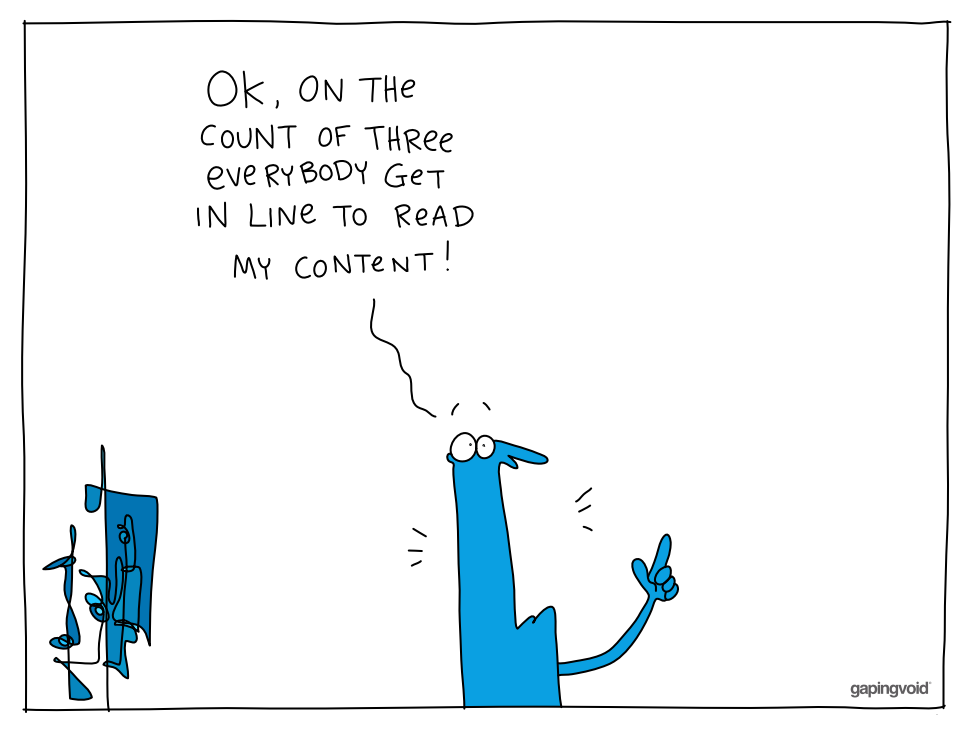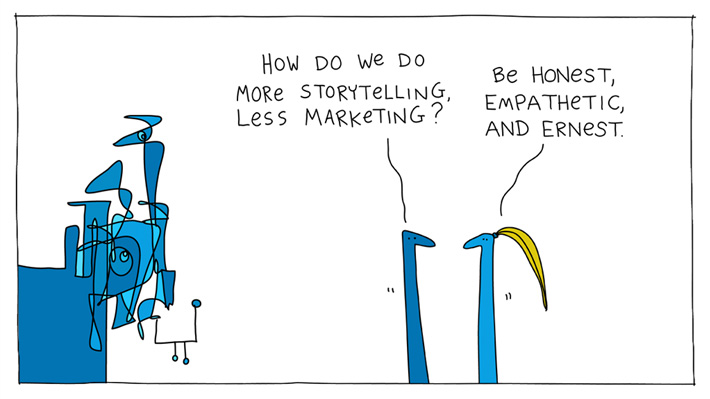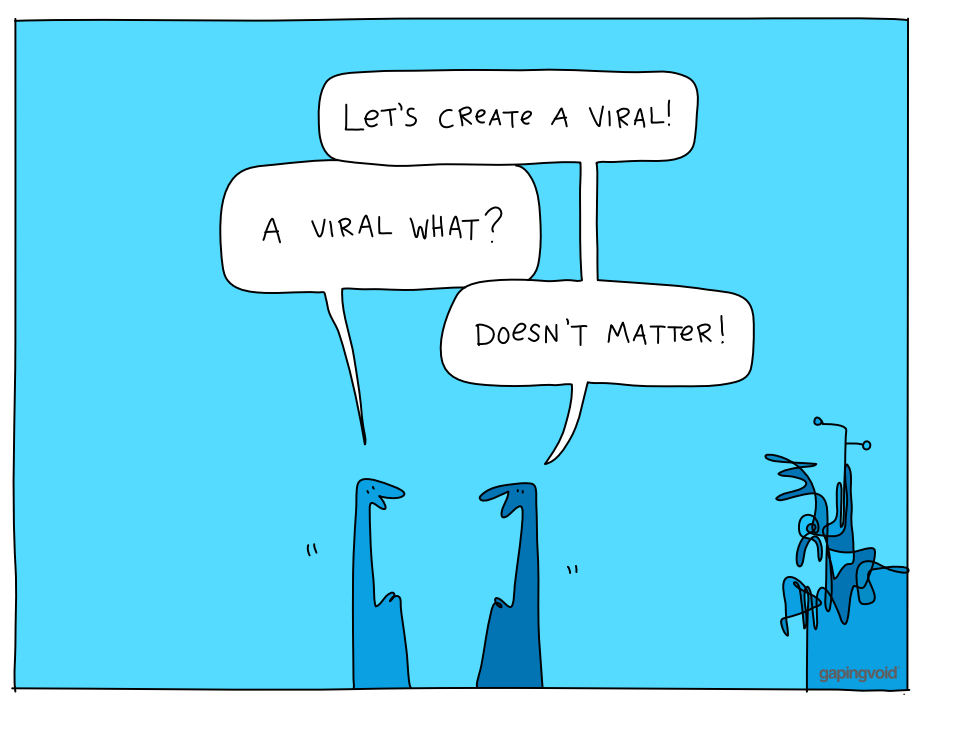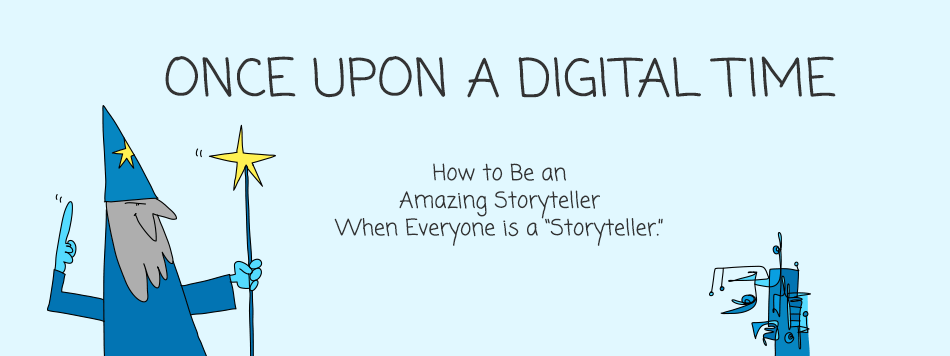-------
Dear Feedburner Readers, we'll soon be shutting down our feedburner plugin. If you'd still like to receive news from Brian Solis, please scroll to the bottom of www.briansolis.com and subscribe to the newsletter.
-------

I recently had the privilege to work on a very special project with my friends at GapingVoid and LinkedIn. We set out on a creative endeavor to explore the intersection of story, art, humor and candor as a means of fostering self-reflection and inspiring personal and professional change. The result is a something I’m very proud of…a new short and sweet but compelling ebook, Once Upon a Digital Time: How to be an amazing storyteller when everyone is a “storyteller.”
To help promote the release and further contemplate the power of story, I spent time with Megan Golden, Content Marketing Leader at LinkedIn. In our very candid and personal conversation, I shared the story behind the story and why we need to first take back “storytelling” from marketers to learn and unlearn our way to true storytelling and engagement. I wanted to share our conversation with you here. I hope it helps you…
How Storytelling Can Save Marketing: Bestselling author Brian Solis explains why storytelling isn’t just a tactic – it’s a whole new marketing philosophy
by Megan Golden
“Marketers really need to consider that this is a very sacred word.” That’s how Brian Solis, the author of Engage! and X: The Experience When Business Meets Design, launched into our discussion of storytelling. Straight away, it told me that this wasn’t going to be your average discussion about marketers telling stories. It was going to be a lot more challenging for marketers, and it was going to have a lot more to say about how our discipline needs to evolve.
I had the chance to interview Brian as part of our work together on Once Upon a Digital Time, a new eBook that explores why marketers have become so obsessed with telling stories – and what that really means for the future of our discipline. We created the book with Brian and Gapingvoid, the culture design group co-founded by Brian’s long-term artistic collaborator Hugh MacLeod. The result is a challenging take on what storytelling really means for marketers that, thanks to Hugh’s fantastic illustrations, is also very funny.
Interviewing Brian was my chance to explore some of the big ideas in Once Upon a Digital Time in some more depth. He didn’t disappoint. As he explains in this interview, Brian believes that marketers who simply adopt the title of storytellers aren’t doing the hard yards they need to do, to get this right. Storytelling isn’t just a sacred concept, it’s also a concept that demands real commitment – and real organizational change. The reward for going through that journey towards becoming a genuine storyteller is a future-proofed approach to marketing itself.
Here’s how our discussion played out:
 Megan Golden:
Megan Golden:
There are over half a million LinkedIn members with storytelling listed in their profile. Why are modern marketers self-categorizing themselves as storytellers?
Brian Solis:
I always remember a quote from a very interesting, well-known advertiser, who was fond of saying to agencies and other marketers, “You’re not an effing storyteller!” This advertiser had read an interview with one of the most famous rollercoaster designers in the world, and this rollercoaster designer categorized his work as storytelling. For the advertiser, this showed how easy it is for us to believe we’re storytellers, just because we produce content or we produce experiences. He was making the point that being a storyteller takes much more than just saying you’re a storyteller. We keep saying it, not because it’s true, but because it feels good to say you’re storytelling instead of admitting you’re in marketing.
Personally, I think of storytelling as an aspirational title of sorts. I’m an optimist and so I want to believe that marketers do genuinely believe that they’re storytellers. What they need to consider though, is that this is a very sacred word. We’ve bought into the aspiration and the ideal of storytelling-based marketing, but we haven’t yet gone through the exercise of what it actually takes to become a storyteller.
I realized this several years ago when I was writing my book, X: The Experience When Business Meets Design. I was guilty of thinking that, because I was in control of the narrative, I was a storyteller. I wasn’t. My response was to find a storyboard artist to teach me the art and science of storytelling. That made a big difference, but I can tell you that even after going through that, I would never put storyteller in my title. It’s too sacred a term and we have to respect that.
 Megan Golden:
Megan Golden:
You say in our book that marketers have ended up distracted by social media follower numbers, and lost their sense of purpose. How do you know when the purpose is missing? And how can you reclaim it through storytelling?
Brian Solis:
The challenge for marketing is that it’s adapting storytelling, it’s adapting social media, it’s adapting mobile, it’s adapting all of these new channels on the basis of a classical foundation of what marketing means. It has a traditional matrix that has to adapt to new times, technologies and trends. That matrix ends up focused on the wrong things.
It’s not that marketers don’t get it. It’s more that they’re packaging technology into a construct that they know. It’s self-reinforcing. Executives therefore see marketing in these terms, and fund it and support it in these terms. They’re supporting what marketing is, not what it could be.
This is a time for reinvention and innovation. In the book, we talk about using storytelling not just as a guiding light for the future of engagement and experience, but also as a catalyst to drive innovation. What does it take to tell a great story? What does it take to really understand your audience? What does it take to be really compelling? What does it take to move, guide and inspire them?
The answers to those questions are going to take some marketers out of that old construct and start them building something new: a new generation of marketing that’s less about ‘Marketing’ and more about experience and engagement.
This raises the question: once I have your attention and you have my attention, what are we going to do about it? When you start thinking in these terms, you’re stepping in a new direction, and you continue to step in new directions as you pursue these ideas. I call it ‘progressive transparency,’ moving beyond what marketing used to focus on and taking an interest in ‘The Embrace’, or what happens when you engage.
The challenge that marketers have today is that their budgets, resources and expertise are all emblematic of how we viewed marketing yesterday, not of how marketing needs to be tomorrow. We get caught up in these cycles of allowing marketing to be driven and guided by executives, who want to see certain things communicated in certain ways. I mean the fact that legal has such a strong voice in what we can say and what we can’t say, or what the narrative has to be according to the “optics of the organization”. These are all designed based on yesterday’s view of what marketing is, and this holds marketing back from what it could be.
Megan Golden:
How were you originally connected with Hugh MacLeod and what is it about Hugh’s illustrations that you feel really bring your words to light?
Brian Solis:
I was part of the startup community that eventually became Web 2.0 and then developed into social media. Hugh was also part of that group. He was coming from Savile Row and leaving the advertising world behind. He was using cartoons to express some of the really amazing things that technology was starting to empower us with, and all of the paradoxes that it had introduced into our lives. He was also taking shots at the way marketing kept focusing just on the next advertisement. We orbited the same circles in the Web 2.0 world and in its earliest stage, that community wasn’t just about working. It was also about validation and self-help and support. We would meet for drinks and bring all of the entrepreneurs together to talk about what we were working on, and help us get everything to the next level. I just instantly bonded with Hugh. He’s a wonderful human being and so witty and clever.
 Megan Golden:
Megan Golden:
You wrote a book a couple years ago, X: The Experience When Business Meets Design. In there you talked about the need for businesses to invest in experience architects. Can you explain how storytelling plays into the design of those experiences?
Brian Solis:
Once I got to the core of what an experience was, I realized that you can’t design experiences unless you’re intent on them. When someone comes into contact with your brand, your product, your service, your packaging or your representative, you don’t want them just feeling the value of those parts; you want them to feel more than the sum of those parts. You have to design the experience as a story where everything comes together into an arc that people will feel, walk away with, and talk about. So, it was very intentional way of looking at experiences. I think it was a little early as an idea, and now it’s starting to be appreciated a bit more.
So, the idea of becoming an experience architect is essentially not unlike becoming a storyteller. It’s about being able to build experiences by transforming every aspect of a company around the experiences you want to deliver.
The real challenge is that we approach all this acting like marketers. We talk like marketers. We measure like marketers. We talk at people based on what other people have approved us to say and none of it feels human. That has to change. The first step is realizing that we’re in denial. Then we can accept the need for change and start moving in a new direction.
“I love receiving generic emails and text messages,” said no-one ever. We have to understand that marketing is what it is. The reason it doesn’t have a seat at the table in most C-suite discussions is because it’s not aligned with business growth and it’s not aligned with customer experiences.
But it could be! Marketing doesn’t have to be a discipline or a function. It could become the work that customer experience teams are doing by using communication, touchpoints, technology and channels to deliver experiences holistically. I think marketing’s futures are bigger than we give them credit for because we’re still stuck looking at what marketing was rather than what it could be. The reason storytelling in marketing matters is because it starts to force us to move beyond that. When we accept it as the sacred term that it really is, it absolutely demands transformation. It’s not just another marketing tactic.
—
Please download Once Upon a Digital Time to learn the philosophy and creative process that can help you tell genuinely compelling stories. At a time when everyone thinks of themselves as a “storyteller”, Once Upon a Digital Time will help you to become the real deal. It’s irreverent, it’s inspiring, and it could change the way you go about creating content.
Brian Solis
Brian Solis is principal analyst and futurist at Altimeter, the digital analyst group at Prophet, Brian is world renowned keynote speaker and 7x best-selling author. His latest book, X: Where Business Meets Design, explores the future of brand and customer engagement through experience design.
Invite him to speak at your event or bring him in to inspire and change executive mindsets.
Connect with Brian!
Twitter: @briansolis
Facebook: TheBrianSolis
LinkedIn: BrianSolis
Instagram: BrianSolis
Youtube: BrianSolisTV
The post How true storytelling can save marketing (and more…) appeared first on Brian Solis.
